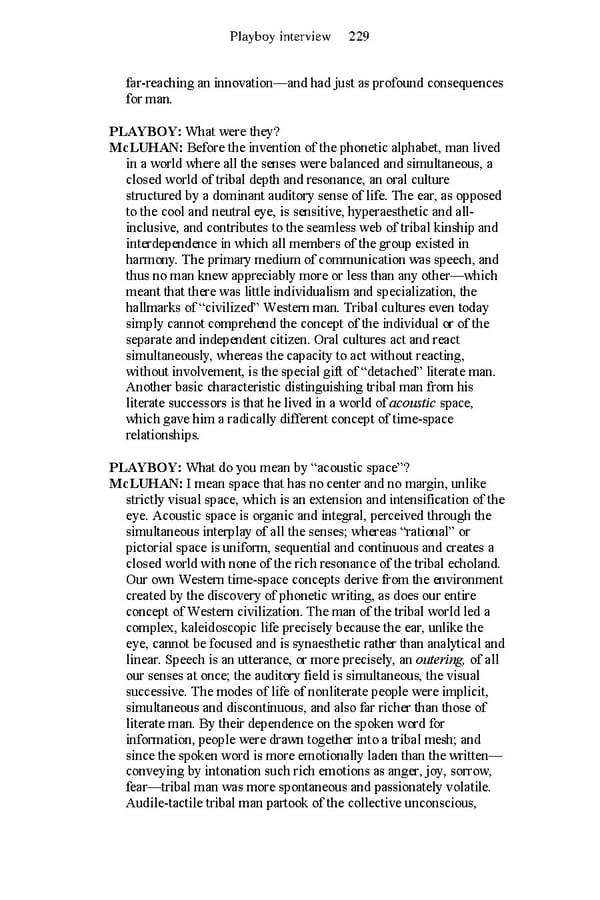Playboy interview 229 far-reaching an innovation—and had just as profound consequences for man. PLAYBOY: What were they? McLUHAN: Before the invention of the phonetic alphabet, man lived in a world where all the senses were balanced and simultaneous, a closed world of tribal depth and resonance, an oral culture structured by a dominant auditory sense of life. The ear, as opposed to the cool and neutral eye, is sensitive, hyperaesthetic and all- inclusive, and contributes to the seamless web of tribal kinship and interdependence in which all members of the group existed in harmony. The primary medium of communication was speech, and thus no man knew appreciably more or less than any other—which meant that there was little individualism and specialization, the hallmarks of “civilized” Western man. Tribal cultures even today simply cannot comprehend the concept of the individual or of the separate and independent citizen. Oral cultures act and react simultaneously, whereas the capacity to act without reacting, without involvement, is the special gift of “detached” literate man. Another basic characteristic distinguishing tribal man from his literate successors is that he lived in a world of acoustic space, which gave him a radically different concept of time-space relationships. PLAYBOY: What do you mean by “acoustic space”? McLUHAN: I mean space that has no center and no margin, unlike strictly visual space, which is an extension and intensification of the eye. Acoustic space is organic and integral, perceived through the simultaneous interplay of all the senses; whereas “rational” or pictorial space is uniform, sequential and continuous and creates a closed world with none of the rich resonance of the tribal echoland. Our own Western time-space concepts derive from the environment created by the discovery of phonetic writing, as does our entire concept of Western civilization. The man of the tribal world led a complex, kaleidoscopic life precisely because the ear, unlike the eye, cannot be focused and is synaesthetic rather than analytical and linear. Speech is an utterance, or more precisely, an outering, of all our senses at once; the auditory field is simultaneous, the visual successive. The modes of life of nonliterate people were implicit, simultaneous and discontinuous, and also far richer than those of literate man. By their dependence on the spoken word for information, people were drawn together into a tribal mesh; and since the spoken word is more emotionally laden than the written— conveying by intonation such rich emotions as anger, joy, sorrow, fear—tribal man was more spontaneous and passionately volatile. Audile-tactile tribal man partook of the collective unconscious,
 Essential McLuhan Page 235 Page 237
Essential McLuhan Page 235 Page 237